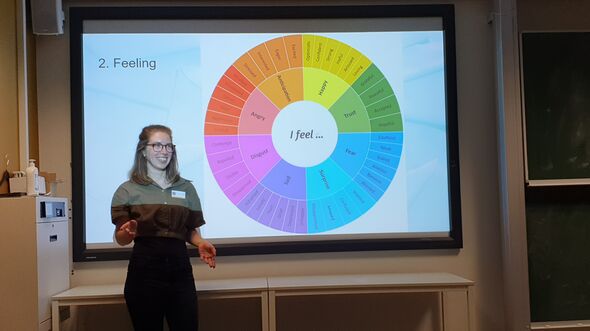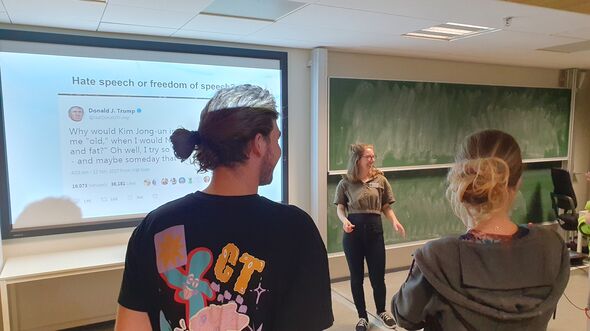Cursor goes course-hopping | Word usage
Since it’s never too late to learn, we at Cursor always make time for a good course. This time, Cursor joins the Power of Words workshop offered by TINT on Tuesday night in a lecture hall in MetaForum. Kimberly Drabbels, the organization’s program manager wants to explore with us the fine line between hate speech and freedom of speech and also has an exercise in non-violent communication planned for us. Perfect timing.
I love it when workshops live up to their name. Here, too, we have to work on a problem from our own lives. In my case, that problem happened a mere two hours ago at the time when I and the seven others are tasked with analyzing a recent problem. What exactly happened, how did it make you feel and what do you actually want? Well, earlier this day, I sat down with my housemate and had some proverbial “words” with him. This is why: I was angry because he hadn’t done something I wanted him to do and he was angry because I was being unreasonable. It was all rather vague.
Observing
When observing what happens, it is easy to make mistakes, Drabbels points out. Perhaps you’re using verbs with a value judgment attached: “John puts everything off.” Or you’re presenting your own conclusion as a fact: “She won’t get her work done.” Or you’re being unclear: “The neighbors are making a mess of things.” “When you separate your judgment from your observation, you make yourself clearer. The sentences become: “John only studies the night before his exam,” “I don’t think she’s going to get her work done” and “I haven’t seen the neighbors clean up their yard in a long time,” she says.
Non-violent communication
All the participants in the Power of Words workshop are handed a fill-in-the-blanks sheet to respond to the person with whom they have conflict in a non-hurtful way. “When I see (1), I feel (2) because my need for (3) is not being met. Would you be willing to (4)?” After filling it out, we get to discuss our answers with a fellow participant, and I am paired up with Gergely Fodor, who plays an active role at TINT. After Drabbels' input, 1,2 and 3 are easy to describe, but I'm really struggling with 4. My answer: “When I see that you didn’t see my note on the fridge, I feel disappointed because my need for control is not being met. Would you be willing to use your eyes from now on!" Electrical Engineering student Fodor strongly advises against using that last one. So what’s the alternative? His suggestion: “Would you be willing to look if there are any post-its?” But honestly, that seems like too much to ask. Maybe I should just tape the fridge shut and write the message on the duct tape from now on. We’ll see.
A fine line
Words do not only have power in personal conversations, but on TV and social media as well. But what are the limits? There is a fine line between freedom of speech and hate speech, as Drabbels showed us at the start. We were shown tweets and still images from TV shows and were asked to indicate whether we thought they constituted hate speech or free speech. Only one person considers a call to put white people in a microwave not to be hate speech. “That’s obviously a joke,” she says. But when is something considered a joke? To some people, the Wheel of Fortune episode of South Park with the word N.GGERS is a joke; others think it goes too far. A tweet by ex-President Trump about Kim Jong Un also raises many doubts within the group. “Can we also stand in the middle for a new category; “simply stupid”?”
Although there is a clear definition for freedom of speech , that is not the case for hate speech. In our discussion afterwards, we and Drabbels agreed on how we define the term. “When you carry out hatred towards a group based on intolerance. But even with individuals, it’s not acceptable to make jokes at the expense of another person. It’s all about how you frame it, you can say whatever about objects or opinions, but you rather not say hateful things towards a group or individual.”
Discussion group
What strikes me is that there are not a lot of participants, but everyone is speaking out openly. People give spontaneous advice. “Never start your feedback in a conflict with “You”, but use “We” instead. After all, you have to try to work it out together.” Drabbels has a final piece of advice for us: “Don’t blame but educate.”
TINT is an organization that supports all Eindhoven students and PhD students with their mental well-being, personal development and life questions. The reason why the program manager is so passionate in giving this workshop is because she attended a European training in this area in December. The podcast on this topic can be found on TINT’s website.
In the ‘Cursor goes course-hopping’ feature, our editors will take part in the various training sessions, courses and workshops that TU/e offers throughout the year with the aim of allowing students and staff members to increase their knowledge and skills in a variety of fields. If you happen to offer a course, training session or workshop yourself that might be of interest to this feature, or if you know of any such event, don’t hesitate to contact Cursor’s editorial board.




Discussion